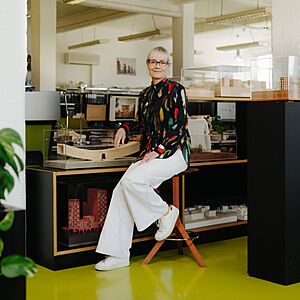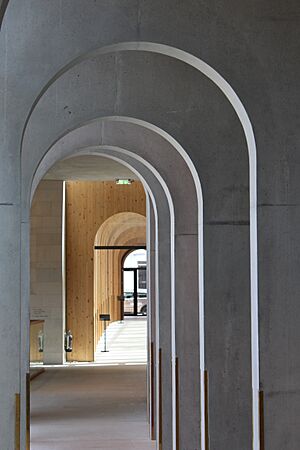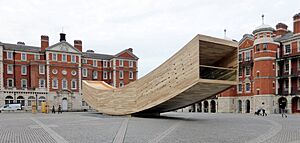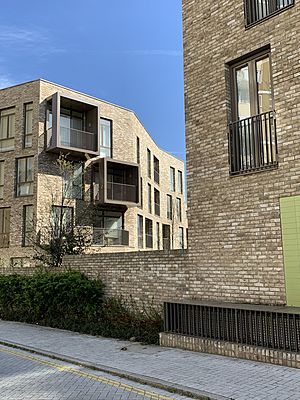Alison Brooks facts for kids
Quick facts for kids
Alison Brooks
|
|
|---|---|

Alison Brooks in studio at Highgate Studios, London.
|
|
| Born | 1962 (age 63–64) Welland, Ontario, Canada
|
| Alma mater | University of Waterloo |
| Occupation | Architect |
| Practice | Alison Brooks Architects |
| Buildings | Exeter College Cohen Quadrangle (Oxford), Newhall Be (Harlow), Quarterhouse Performing Arts Centre (Folkestone), Accordia Brass Building and Sky Villas (Cambridge), Ely Court (London), Windward House (Gloucestershire), Salt House (Essex) |
| Projects | The Smile (Chelsea School of Art) and her two installations at the Venice Architecture Biennale |
Alison Brooks is a famous Canadian-British architect. She was born on December 29, 1962. She started her own architecture company, Alison Brooks Architects, in London. Her company is known for winning many important awards. These include the RIBA Stirling Prize and the RIBA House of the Year.
Alison Brooks has designed many amazing buildings. Some of her well-known projects are the Exeter College Cohen Quad at Oxford University and a special art project called The Smile at the Chelsea College of Arts. In 2018, she was asked to show her work at the Venice Architecture Biennale. Her company was also named Dezeen Architect of the Year in 2020.
Contents
Becoming an Architect
Alison Brooks grew up in Canada. She lived in Welland and then Guelph, Ontario. She studied architecture at the University of Waterloo and finished her degrees in 1988.
After her studies, Alison moved to the United Kingdom. She worked with a designer named Ron Arad. She became a partner in his company in 1991. Together, they designed the lobby of the Tel Aviv Opera.
In 1996, Alison Brooks started her own company, Alison Brooks Architects. A year later, she got her first big project: designing the inside of a hotel on a German island called Helgoland.
Designing Homes and Buildings
Alison Brooks Architects has designed many beautiful homes. Some of her early projects include VXO House, Wrap House, and Salt House. These homes were known for their elegant and modern style.
Her company also designed the Sky Villas and Brass Building in a project called Accordia in Cambridge. This project won the Stirling Prize in 2008. This success led to more work in designing housing. Other important housing projects include Newhall Be and Ely Court in London.
In 2021, a house she designed called Windward House (also known as House on the Hill) won the RIBA House of the Year award. The president of the Royal Institute of British Architects, Simon Allford, said it was a "truly remarkable home."
Buildings for Learning and Culture

Alison Brooks designed Quarterhouse in Folkestone, which opened in 2009. It was her first building for performing arts. The building has a unique outer layer that looks like fluted mesh. This design was inspired by local scallop shells and stage curtains.
Another important project is the Exeter College Cohen Quadrangle at Oxford University. This building opened in 2017 and won many awards for its design. It has an innovative outer design and is a great place for students to learn.
Alison Brooks Architects was also chosen to help redesign a building for the London School of Economics.
Art and Exhibitions
In 2016, Alison Brooks created "The Smile" for the London Design Festival. It was a public art structure at the Chelsea College of Art. It showed how strong and interesting cross-laminated hardwood can be. Engineers said it was a very complex structure. Alison Brooks wanted to show that wood is a great building material for the 21st century.
Her company has also shown work at the Venice Architecture Biennale four times. In 2018, her "ReCasting" exhibit showed four special structures that looked like "totems." In 2021, her "Home Ground" exhibit explored how housing shapes our lives in cities.
Designing for Communities
Alison Brooks Architects believes that housing is very important for communities. They design projects that include homes for people with different incomes. Ely Court in London, completed in 2015, is a good example. This project replaced an old building with new homes and public spaces.
Alison Brooks wants her designs to create a sense of community pride. She believes that good housing helps people feel connected and promotes diversity. She says, "Housing is the social project of architecture; it frames everyday life; it forms people's world view."
Awards and Achievements
Alison Brooks is the only architect in the UK to have won three major RIBA awards:
- The RIBA Stephen Lawrence Prize (for The Wrap House in 2006)
- The RIBA Manser Medal (for the Lens House in 2014)
- The RIBA Stirling Prize (for her work on the Accordia project in 2008)
In 2012, Building Design Magazine named her Architect of the Year. In 2013, she received the Woman Architect of the Year Award from the Architects' Journal. Judges praised her mix of sculpture, architecture, and detail. In 2020, Alison Brooks Architects was named Dezeen Architect of the Year. The judges called her company "groundbreaking" for how they question normal ideas in architecture.
Her company has won many other awards for their projects, including:
- RIBA House of the Year for Windward House (2021)
- RIBA Regional and National Awards for Exeter College Cohen Quad (2022)
- Housing Architect of the Year by Building Design (2020)
- Wood Awards for The Smile (2017)
- RIBA National Award for Ely Court (2016)
- Housing Design Awards Supreme Winner for Newhall Be (2013)
Books by Alison Brooks
Alison Brooks has shared her ideas and design methods in her books.
- In 2014, she published Synthesis: Culture and Context.
- In 2017, she released Ideals then Ideas, which came out 21 years after she started her company.
- In 2018, she co-wrote an article for the Harvard Business Review called "The Surprising Power of Questions."
See also
 In Spanish: Alison Brooks para niños
In Spanish: Alison Brooks para niños
 | Leon Lynch |
 | Milton P. Webster |
 | Ferdinand Smith |



